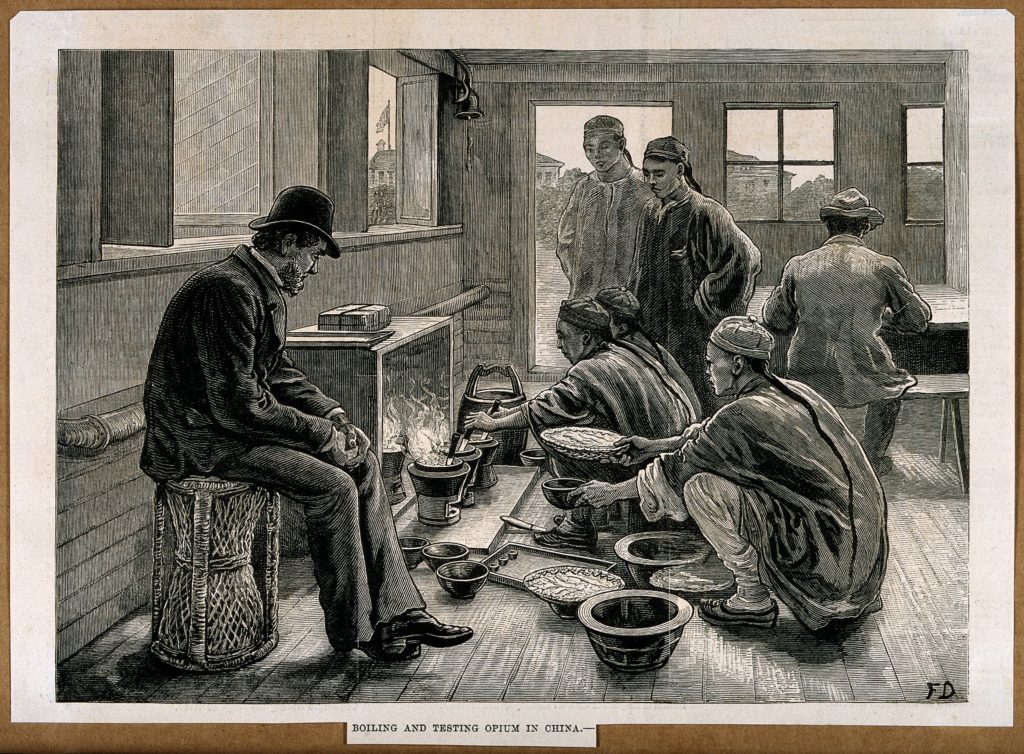
The British East India Company is a conspicuous specimen of a capitalist enterprise monopolising an entire subcontinent and leaving horror and destruction in its wake. During the 18th century, the Portuguese were the first to employ opium poppies in a lucrative business, growing it in India and exporting it to China. Gradually, opium became a significant colonial commodity intermingled with the trade of tea, sugar, cotton, and slaves. The Europeans had become accustomed to sweetened tea; hence the West witnessed an outrageous demand for Chinese tea and other products. This demand for sugar further led to the displacement of thousands of indentured workers to the Caribbean from India.
In contrast, China seemed to be quite self-sufficient and a similar demand for European goods did not arise. Europe thus began to suffer from colossal trade deficits, acquiring Chinese commodities in exchange for silver. It’s a well-established fact that Warren Hastings, the first Governor-General of India, was primarily the one who conceived the idea of planting opium in Bengal and peddling it to China. The expansion of the opium trade was intended to solve the chronic trade imbalance between Britain and China. The East India Company soon established a monopoly over the opium trade in the subcontinent, routing it from Calcutta to Canton, presently known as Guangzhou. Several restrictions, forbidding the manufacture, sale and usage of opium were imposed by the Qing dynasty, when opium imports and addiction rapidly escalated in China. In 1830, the Chinese emperor even issued an edict warning the public about the detrimental consequences of consumption of opium. He further declared that capital punishment would be awarded to those who were exposed using opium.
Due to the Chinese embargo on the opium trade, the East India Company deployed ‘country traders’, a charming euphemism for smugglers, to ferry opium from India to China. They were seasoned and accredited drug peddlers, receiving protection from The East India Company. The profits yielded through this exchange were then divided between the Company and the smugglers. Consequently, opium addiction reached its culminating point when it started influencing the imperial troops and noble classes of the Qing dynasty. The various restrictions imposed by China led to the Opium Wars, with resounding defeats for the Chinese leading to a gradual decline in the power of the dynasty and the legitimation of the trade.
The East India Company had monopoly primarily over the Bengal opium that was grown in Bihar and Benares during the early 19th century. Many Indians traders and Princely states also participated in this lucrative market. The most successful Indian business community to thrive in this trade were the Parsis of Bombay. The prime reason for their success was the geographical location from where they operated. They invested in the production of opium in the Malwa region over which the East India Company had limited control and smuggled it through the Sind coast. This route was ideal for indigenous traders to evade the pass duties imposed by the Company at the Bombay port. The British tried to regulate and restrict this trade by levying several taxes to exterminate the competition they were experiencing in the Chinese market.
Sir Jamsetjee Jeejeebhoy, a Parsi merchant, was the first Indian to be knighted and awarded baronetcy by Queen Victoria in 1942 and 1958, respectively. He was also the pioneer of the opium trade managed by Indians. In 1805, he was abducted by the French while peddling opium to China. When taken to South Africa as a hostage, he, fortunately, befriended a young surgeon of the East India Company called William Jardine who along with his business partner James Matheson founded the largest opium organization in Canton. They also played a significant role in acquiring Hong Kong from the Chinese.
The brutal defeat in the Opium Wars was disheartening for the Chinese and provided a fatal blow to their dignity and well-being. Due to the defeat, they had to surrender Hong Kong to the British. Soon the Chinese economy deteriorated, and the society turned into a deranged entity with a surge in opium addicts. The cultivation of poppies was not as fruitful for the Indian peasants as it was for the Indian traders and the British. The peasants were impoverished and exploited regularly considering the cost of cultivating opium was much higher than what the British paid for it. Moreover, these peasants were trapped by contractual obligations which made their lives miserable and escape futile.
In India many people are not aware of the various aspects and events of the opium trade during the 19th century. Individuals like Jamsetjee Jeejeebhoy and other Indian industrialists have deliberately concealed their vicious connection to the opium trade, under the modest garb of “China trade”. The most probable reason for whitewashing the past may be a sense of shame or guilt which these Indian traders experienced for being an accomplice to the disintegration of China as a country. Thus, India and Britain have intentionally “suffered” from historical amnesia where the pain and sufferings of the Indian peasants and the Chinese people have entered oblivion. Today, nevertheless, we can certainly claim that the British operated the largest legal drug cartel of the 19th century and the “flower of ruin” affected both India as well as China, setting the latter on a path of complete humiliation for the next century.



I used to be able to find good information from your content.
You must take part in a contest for the most effective blogs on the web. I’ll suggest this web site!
I went over this web site and I think you have a lot of excellent info , saved to my bookmarks (:.
Excellent blog here! Also your web site loads up very fast! What host are you using? Can I get your affiliate link to your host? I wish my web site loaded up as fast as yours lol
Rattling superb info can be found on blog.
I’m often to blogging and i actually recognize your content. The article has actually peaks my interest. I’m going to bookmark your website and keep checking for brand new information.
After I initially commented I clicked the -Notify me when new feedback are added- checkbox and now every time a remark is added I get four emails with the identical comment. Is there any means you may take away me from that service? Thanks!
It is really a great and useful piece of info. I’m glad that you shared this helpful info with us. Please keep us up to date like this. Thank you for sharing.
Yeah bookmaking this wasn’t a high risk conclusion outstanding post! .
I’ll immediately clutch your rss as I can’t to find your email subscription link or e-newsletter service. Do you’ve any? Please allow me know in order that I could subscribe. Thanks.
Howdy! This is my first comment here so I just wanted to give a quick shout out and say I genuinely enjoy reading your articles. Can you suggest any other blogs/websites/forums that deal with the same subjects? Thank you so much!